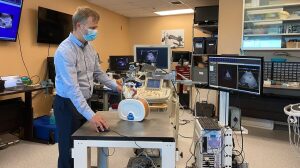by
John R. Fischer, Senior Reporter | February 02, 2023

A new 3D ultrasound system can reduce the risk of recurrence in liver cancer by accurately ensuring the complete ablation of tumors.
To prevent cancer recurrence, Canadian researchers have developed a new 3D ultrasound system for ensuring complete destruction of liver tumors with thermal ablation.
Thermal ablation has fewer complications and a shorter recovery time than surgery and can be used on patients who are unable to undergo surgical operations. But it requires precise needle placement to treat the cancer without damaging surrounding vital organs and blood vessels.
The technique utilizes the real-time imaging capabilities of conventional ultrasound and the 3D imaging capabilities of CT, said the researchers from Western University and Law Health Research Institute.




Ad Statistics
Times Displayed: 44472
Times Visited: 1374 Keep biomedical devices ready to go, so care teams can be ready to care for patients. GE HealthCare’s ReadySee™ helps overcome frustrations due to lack of network and device visibility, manual troubleshooting, and downtime.
“Our next step is to move from simulation studies to a clinical trial,” said Dr. Derek Cool, professor at Schulich School of Medicine & Dentistry, associate scientist at Lawson, and interventional radiologist at London Health Sciences Centre, in a statement. “If proven effective, the robotic ultrasound system’s portability could potentially allow for more widespread use of 3D ultrasound imaging, including in smaller healthcare centers. By eliminating the need for CT scans, it could also help to reduce imaging wait times.”
The system utilizes a robotic cradle to move a standard ultrasound probe and collect and stack images together to create the 3D scans.
In a simulated study of 14 patient cases, the new solution completely ablated tumors in 92.9% of cases (13 of 14), compared to 64.3% with conventional imaging. The one remaining case would benefit from increasing ablation time or intensity, according to the researchers.
“If a clinical trial shows the approach is more accurate and more precise than conventional techniques, there would be a direct impact on patient care,” said Aaron Fenster, professor at Schulich Medicine & Dentistry and scientist at Robarts Research Institute. “We hope to explore commercialization to license the technology and distribute it worldwide.”
The study was published in
IEEE Transactions on Medical Imaging.

